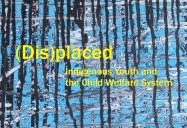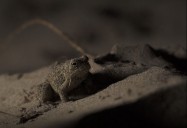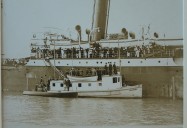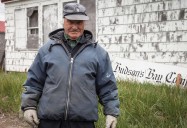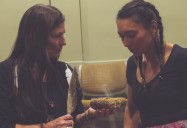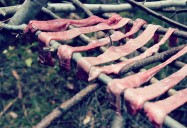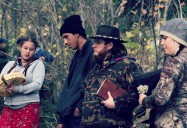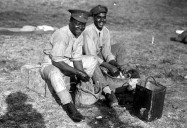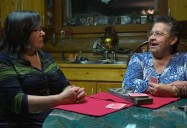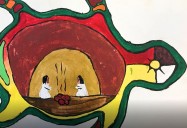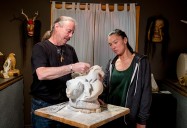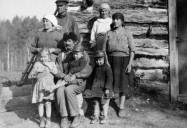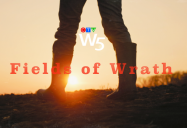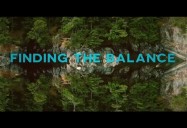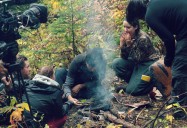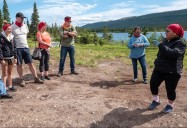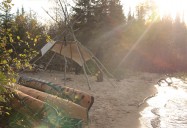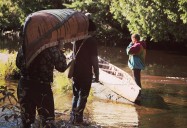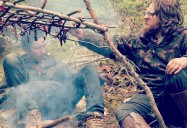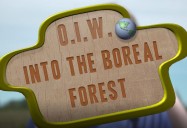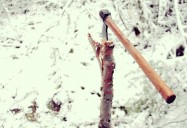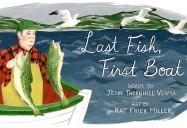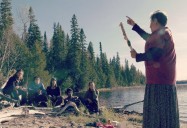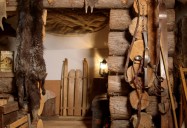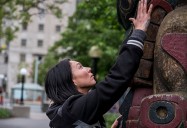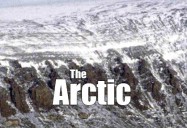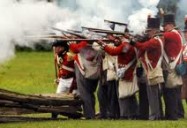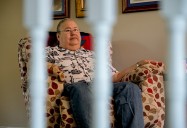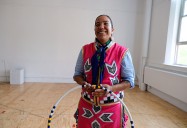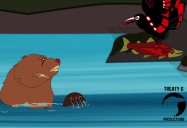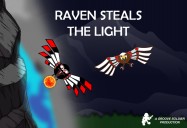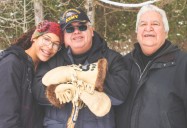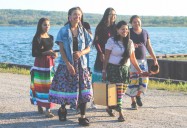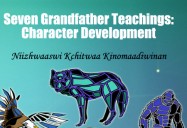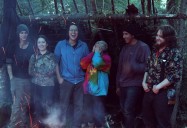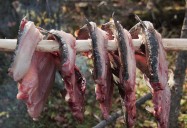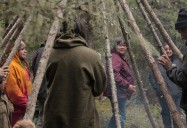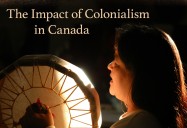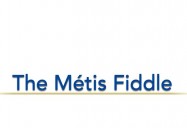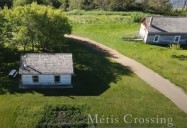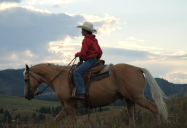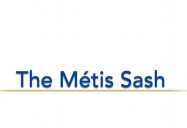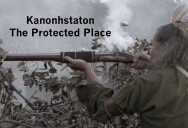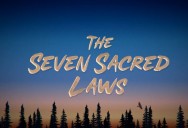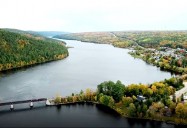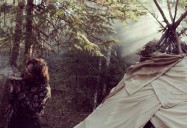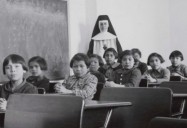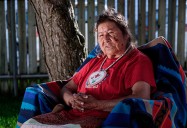
- TDSB: Art
- TDSB: Black History
- TDSB: Canadian & World Studies
- TDSB: Canadian Social Studies & First Nations
- TDSB: Career Studies & Character Ed
- TDSB: Equity & Diversity Studies
- TDSB: Financial Literacy
- TDSB: Food, Fashion & Clothing
- TDSB: Health & Phys Ed
- TDSB: Health/Safety/Abuse
- TDSB: Language
- TDSB: My Job Rocks Series - Career Education
- TDSB: PBS Playlist
- TDSB: Science
- TDSB: Social Sciences & Humanities
- TDSB: Social Studies
TDSB: Canadian Social Studies & First Nations
Overview Of The War of 1812: Canada AM
Width Height
Subject(s): Canadian History, Canadian Social Studies, History, World History
Grade Level: 6 - 8, 9 - 12
200 years ago on June 18th, 1812, President James Madison and the United States Congress declared war on Great Britain. Battles raged throughout the continent for over two years before peace was negotiated. To mark this bicentennial, CTV's Canada AM spent the day at historic Fort George in Niagara-on-the-Lake. The various segments will give students a brief overview of the life and times of officers; the role of First Nations people; the role of Laura Secord; and the importance of the War of 1812 in Canada's history.
Segments include:
- Introduction
- The Importance of the War of 1812
- Role of First Nations in 1812
- Laura Secord's role in 1812
- Food for officers at Fort George
- Fashion during the War of 1812
|
Running Time: 30:00 Country of Origin: Canada Captions: |
Producer: CTV Copyright Date: 2012 Language: English |
Video Chapters
-
A Brief History of the War of 1812 4:19
A brief overview of the causes and consequences of the War of... -
Fashion at Fort George 3:13
Examine the uniforms and clothing that officers and their wives... -
First Nations Contributions: War of 1812 3:40
Ojibway author Drew Hayden Taylor discusses the pivotal role... -
Food at Fort George 3:15
Examines the culinary delights eaten by officers stationed at... -
Historical Interpretation: War of 1812 5:57
Historians discuss the harsh conditions for soldiers and the... -
Introduction to the War of 1812 3:39
Students from Thorold, ON share their knowledge of the War of... -
Laura Secord 5:07
Laura Secord is one of Canada's greatest heroines. She warned... -
Tour of Fort George 3:42
Built in 1796 and occupied by the British until 1813, students... -
Introduction 3:39
-
Tour of Fort George 3:42
-
Laura Secord 5:07
-
Food at Fort George 3:15
TRANSCRIPT
Close- So how much do you know about the War of 1812? We went to the Thorold, to Prince of Wales Public School and talked to some grade seven student there to find out how much they knew. Wait till you hear how much they actually know about 1812.
- The US declared war on the British.
- Something that caused the war is the Americans wanted to take over Canada.
- [MUSIC]
- They felt they needed to expand and they couldn't expand to the west, so they started expanding north.
- Another reason is that the British were boarding the American ships when they were trying to trade with other countries.
- One of the bigger battles was the Battle of Lundy's Lane.
- Another big battle in the War of 1812 the Battle of Beaver Dams.
- Another big battle in the War of 1812 fall was Queenston Heights where General Isaac Brock died. Brock was a general and he had lots of the best war strategies.
- Another big player was Laura Secord. Laura Secord overhead the Americans talking about attacking the British at Beaver Dams, so she traveled miles and miles to go find them. And so when she finally came to native land, the natives took her to FitzGibbon and she told him about what she'd heard, and so they came around the Americans the day of the attack.
- The war ended with the Treaty of Ghent in 1850.
- The War of 1812 was important to me because even though America had a lot more troops than us, we still came out to win the war.
- We have our country and we're not the US, so we have our own freedom.
- The War of 1812 is important to me because it brought us to where we are today.
- When I think of the War of 1812, I think of the War of independence in some way. A lot of the time when we talk about it in context of American history, it's called America's second war of independence.
- I think about the discrepancies in the opinion of the Americans and the British and Canadians and how they felt about it and how they all felt that they won.
- I think a major concept is Canada's independence because if I think if this ideal of manifest destiny had not been fulfilled on the part of the Americans, then Canada possibly would have been part of the United States of America.
- The fact that Canadians actually had the guts to go to the states and burn the White House, so again, it really brings up feelings that I'm proud to be a Canadian, that were different from the Americans and we're a strong country that can hold our ourselves up.
- There was so much anger between the Americans and the British and Canada in some ways was collateral damage on the way. And I think it's great that, although it was so sad that so many people died, I think it's great that out of that, came better relations between those three countries.
- Every conflict within history, whether it's the US or Canada or any other country, it creates a change and reveals things about-- like underlying tensions or the way society works.
- A lot of us have talked about how we can understand history by learning it, but I also think that it's really good for appreciating what we have today.
- I really hope that people will take the time to learn a bit more about the war. Not necessarily the specifics of the war, but more about the significance, why it's important to them, and what it really means in terms of being a Canadian.
- It's the reason why I am Canadian and it is why we have such a strong and powerful country today.
- People should appreciate that we're not just another country beside America, we're Canada. So it's important that we remember where it came from.
- From June 18, 1812 to February 16, 1815, the United States was at war with Britain. Canada was the battleground. The War of 1812 is an important milestone in the emergence of Canada as a free and independent nation. The end of war laid the foundation for confederation. Canada would not exist if the American invasion of 1812 to 1814 had been successful.
- In 1793, Great Britain was forced into a war with revolutionary France that would last for the next two decades, with only one very brief period of peace. The war became global in nature as Napoleon Bonaparte, emperor of the French, sought to establish his dominance over Europe and threatened other parts of the world.
- By 1812, this global struggle was severely strained Britain's resources. After the battle Trafalgar in 1805, the British Royal Navy dominated the seas. The Royal Navy enforced a blockade of Europe to prevent supplies of war-like material, food, and other supplies from reaching their enemy.
- The Navy forced to ships of neutral nations to enter British-controlled ports, where contraband cargoes were seized. Neutral merchant ships were stopped on the high seas to be searched by British sailors.
- To keep the Navy manned, a shortage of volunteers forced the British two press, or conscript, men to serve in the Navy. The British, like many nations, did not recognize the validity of naturalization and considered all British-born men to be British subjects, even if they had emigrated to another country and become naturalized citizens of that country.
- British-born sailors manning ships from neutral nations, even those carrying American citizenship papers, were pressed into the Royal Navy. To the new Republic of the United States, these actions on the high seas and the seizure of American citizens, violated American sovereignty.
- Since the end of the American Revolution, the United States had been expanding within North America. Settles continued to move into the interior of the continent, dispossessing and displacing aboriginal inhabitants as settlements were pushed ever westward. First nations people resisted. Resulting in sporadic raids on the frontier settlements and all-out warfare between the United States Army and various aboriginal nations.
- In the last decade of the 18th century and the first decade of the 19th century, Tenkswatawa, a Shawnee prophet, and his brother, Tecumseh, united a number of aboriginal nations in a confederacy to resist American westward expansion. The United States accused Britain of supplying equipment and encouraging aboriginal leaders to repel the Americans. Thus, interfering with America's plans for expansion into the Northwest.
- In response the perception that Britain was failing to recognize the validity of the United States as an independent nation, war fever reached its peak in 1812. On June 18, 1812, the United States declared war on Great Britain. The primary American War objective was to be the conquest of British north America, primarily Upper Canada, Ontario, and lower Canada, Quebec.
- In the following segments, you will explore historic Fort George and Niagara on the lake, and meet several historians and students your page who will explain the importance of the War of 1812.
- You will also get to see what life was like for the officers who lived at Fort George. Through that bitter conflict, Fort George played a vital role. It served as the headquarters for the center division of the British army. These forces included British regulars, local militia, aboriginal warriors, and [INAUDIBLE] of freed slaves. Major General Sir Isaac Brock, the savior of Upper Canada, served here until his death at the battle of Queenston Heights in October 1812.
- Jeff Hutchison is also here, Jeff?
- Hey good morning, Bev, good morning, Marci. I'm actually right behind you and our shot is looking for back toward the main set. Now if you look to your right, Bev and Marci, you see that huge berm, that was designed to prevent artillery from coming in and in that case, hitting the powder magazine, which is on the other side of the berm. So that's one of the things you'll see here is built-up areas like that.
- Now behind me, this is the officer's quarters. We're going to inspect that a little bit later in the show. And this is the guard house, so people coming in and out of the fore would have to check in with the guard house.
- This is a parade grounds. And of course, we have people here in period costumes. This was built in 1796 and occupied by the British until 1813, when the Americans actually totally destroyed it in May of 1813 and then they inhabited this area until December of 1813.
- And this is a block house, recreated in the 1930s. This would sleep anywhere from 150 to 400, depending on your needs. And we're going to go in, because I know there's people sleeping in there, we're going to investigate that. Of course, guarded by two centuries who don't smile, even if you tell them the funniest joke in the world.
- Anyway, we've got much more coming up from Fort George.
- And now, let's go to Jeff Hutchison, we call him our human alarm clock. He's in the barracks here at Fort George.
- Thank you, Marci, I like that. OK, you know what, head in. Here we go. We're now at the block house and wouldn't you know it, that there's been a student program here overnight, students from Prince of Wales secondary school, grade H from Thorold Ontario are her, and we're going to wake them up.
- [DRUMS]
- Let's see if that worked. OK! Up! We're going to start your day! How was sleep last night, pretty good?
- [MULTIPLE RESPONSES]
- We have a couple of yes's and a couple of no's in that. But this is a good example of what this block house would look like. And up here, when the war was on, you could sleep upwards of 150 to 200 people in this small space that you're looking at, so you 25 students-- I think there's 25 of you-- you're clearly in the lap of luxury.
- I mean, look at you, you've got a double bed! That could've been four people during the War of 1812. OK-- we'll give you a second to compose yourself and we'll continue here.
- All right so it is flag raising time here at Fort George, a daily occurrence. And you know, the town of Niagara-on-the-Lake has the only Lord Mayor in the country, it's an elected four-year position. David Eke is the Lord Mayor of Niagara-on-the-Lake. Nice to be here this morning, sir.
- My privilege and welcome to you, Jeff, and to all of Canada AM. This is an exciting moment for us to welcome you to the historical Fort George, the beautiful town of Niagara-on-the-Lake and the start of our bicentennial celebration. So thank you for coming and we all appreciate it as you can see from our citizenry to the left.
- All right, well thank you very much, Lord Mayor. It's great to be here. We're now going to raise the flag this morning. So can I start it? I start? Just pull down? We're raising this flag, of course it's the Union Jack. And the pole here is between 70 and 80 feet tall. There we go. Isn't that great?
- [PATRIOTIC MUSIC]
- Now if we can just catch some wind up there, this is going to look absolutely spectacular. Fife and Drum Corp of the 41st regiment of Foot playing. We'll tie this off. Do you need this?
- Yes sir.
- OK, this is my first flag raising.
- All right and the flag it up for this morning. So there we go. All right, there we go.
- Scott Finlay and Ron Dale join us right now. Scott of course is a historical interpreter. Ron Dale the 1812 bicentennial project manager with Parks Canada. Thank you, gentlemen, for coming.
- Our pleasure.
- Can't resist a uniform, so I'm going to start with you. It's interesting for us to look back and we see the barracks and everything's been rebuilt. Times were pretty harsh, though. Give me a sense of the conditions for these soldiers.
- Well by our standards, definitely harsh. The soldiers coming over here are having particularly long days where it's hard work. They're drilling constantly, they're up very early in the morning, they're locked in their barracks at night, generally speaking. And two meals a day, two changes of clothing. Two of them might be sharing a bed, as well a bunk. 60 people crammed into a room.
- You start to look at that's sort of thing and you go, that's really harsh. By their standards, they're going, I'm getting two meals a day, two changes of clothing, some of them are getting a bunk for the first time and a shilling a day. And when they sign up, they come over either 7 years or 21 years. And we usually talk about the fact that there's so many deductions taken off their pay, that they end up doing 21 years many, many times. But if they survive, they get a pension.
- Tell me something, Ron. Why is it so important that we learn about the War of 1812 200 years later?
- Well, the War of 1812 was a nation-building event. Prior to the declaration of War of 1812, in British North America, there were a number of disparate provinces who didn't really feel akin to each other. But the War of 1812, where they banded together to face a common enemy, gave them common ground. And it really paved the way for confederation in 1867. And in some ways, the more things change-- when we talk about the composition of what was to be Canada, there was diversity here.
- Absolutely. There were people from all different backgrounds. There were African-Canadians, French-Canadians of course. But Irish, English, Scots, Germans, Poles- all banded together in militia units to back up the strong backbone of the regular British army and the First Nations alliances that were crucial to the defensive of Canada at the time.
- You take your show on the road literally, I mean you educate kids and people in general of the War of 1812. What's some common misconceptions or beliefs with regard to that with people? Because, we read a lot about the history and say, well we don't really know who won, for example.
- Right, that's always a contentious issue, isn't it? I think it's people get little tidbits of information, they pick up on one thing or another, they put an emphasis on one part of the war rather than the other. In the states of course, the Battle of New Orleans happens after the war is actually over, so that tends to color their attitude towards it. And in it is a see-sawing war, goes back and forth as well, so there are victories on that side, there are victories on this side.
- And it's a complex war as well. I think that's part of the problem is people have a difficulty wrapping their heads around it. So what you try to do is take it chronologically, explain it how it takes place, where it takes place, and it's simultaneously happening in various locations. And that mixes up people as well. And you kind of take them to the process and that's the best way to get it across what happens.
- What would our country look like, depending on the outcome of 1812?
- Well one of the American intentions, or for many Americans for the War of 1812, was the capture of Upper Canada, what's now Ontario, and lower Canada, what's now Quebec. And the idea was they felt that because there were so many recent American immigrants, particularly in upper Canada, that the capture would be nothing but a mere matter of marching.
- That the British North Americans would welcome the American army as liberators, to throw off the bonds of British rule. Well, they were wrong of course. If the Americans have succeeded, if they had been able to subdue upper Canada--
- They way they thought that they could.
- The way they thought they could. And if they could have held it during the peace negotiations at Ghent in Belgium, then what's now Ontario, likely what's now Quebec, and everything west of that would be part of the United States and the Maritime provinces would likely fall as well and naturally, join United States.
- In any war there are always obviously the fallen, there are also heroic tales. Who would be a hero that would be the top of mind when we talk about 1812?
- The one that comes to mind obviously, that everybody is familiar with, is Isaac Brock. And the interesting thing is he's only in the war for a few months, but he's so critical to the whole defense of this province before that. And I'm not just talking physically, emotionally and psychologically. As he said, his job was to talk loud and look big-- and that's what he does. Of course the capture of Detroit galvanizes the province. As Ron was saying, the diversity of the population-- there was an enormous number of Americans living there.
- They had some help with that as well.
- Well, yes of course. And of course his relationship with the natives was critical to the process as well. And that's really what turned over Detroit. So there's a lot to admire there.
- Laura Secord, of course, is also a very, very prominent figure. When you think about what she undertook and she walks 19 miles through part of what's the Great Black Swamp, I believe, which would have been right outside our gates here, and it's unthinkable.
- We can't imagine doing that sort of thing, that sort of commitment. Certainly these are really heroic people.
- It's a captivating story, from front to back. We've only touched on it, but I appreciate your expertise, gentlemen. Thank you so much.
- Our pleasure.
- If you're just joining us, we are a live from Fort George on gorgeous Niagara-on-the-Lake this morning, commemorating the bicentennial, 200 years since the War of 1812. What you may not know is that First Nations people played a pivotal, pivotal part in this war.
- Joining us now, we've Drew Hayden. he's an Ojibway author. And really if not for first nations, this could have been very, very different outcome, Drew.
- Indeed. Well first things first, it's Drew Haydon Taylor, but you're entirely correct. This was, I think, the last military engagement where native people held the balance of power. And as the popular knowledge goes, if it weren't for the involvement of native troops, Mohawk, Ojibway, all sorts of different tribes along with the American Canadian border, the war would have been a completely different affair.
- Why is it that this is something that we don't often hear about? That often forgotten? I'm thinking back to history class and I remember learning about the War of 1812, but not this aspect of it.
- Well it's the case of the vanishing Indian. And textbooks, over the last 100 years or so, have conveniently left native people out of pivotal periods in Canadian history. Even though we were often the instigators and the people who were responsible for many of the events that happened helped define Canada. But in the last, I don't know how many decades, history is being rewritten and the contributions of native people are being finally recognized.
- I want to talk about the balance of power and had native people, had they gone with the Americans, this would have been a very different outcome.
- Completely because Britain at the time, there was another war happening in Europe, this guy named Napoleon, was sort of sucking up all the British troops at the time, so it was left to the native people to pick up the slack and provide the important back-up and important resources necessary for the British to help defend the border and repel a lot of the American invasions.
- Tell us about Tecumseh and the amazing role.
- Tecumseh was a Shawnee from the Ohio Valley. And what's not really known is the fact that he had no particular love for the British either, but it was a matter of picking the lesser of evils. I believe his father and older brother had been killed by Americans and some of the confrontations they had down there, and he just felt that his dream of having sort of a pan Indian nation would be better achieved through the British than through the Americans, so he decided to throw in his allegiance with the British and do what he can to help do that, in return for the setting up of an independent native homeland, so to speak.
- What would this country look like if not for the vast contributions of First Nations people.
- Well, I think we'd all be talking with the New York accent.
- [LAUGHTER]
- We'd all be in Philadelphia steaks, or whatever they're called. It's hard to foresee the future in that kind of situation, but I think a lot of the major battles would have been lost that Canadians had won, and it's quite probable that the Americans would have had a stronger foothold in Canada and quite possibly would have won the war.
- Drew Hayden Taylor, pleasure to meet you.
- Pleasure is mine.
- Thank you for joining us this morning.
- You probably associate her name with chocolates or maybe even ice cream, but the fact is, Laura Secord is one of Canada's greatest heroines. She, on June 22, 1813, the 37-year-old housewife set off on a journey from her home in Queenston, Ontario, to warn British of an impending American attack.
- Joining us now is Caroline McCormick and you can tell us, Caroline, what your relation is Laura Secord.
- Laura Secord is my great, great, great grandmother. Laura Secord had seven children, six daughters and one son and her last daughter, Hannah, was who I descended from. Hannah was born after Laura's historic walk, so I'm glad she didn't have any problem, or I wouldn't be here today.
- Tell us more, Caroline, about this incredible journey that your great, great, great grandmother took, what the elements would have been like, what she would have experienced doing during that journey to Queenston? Back around that time, it was war time. The area was under occupation, crops had been ravaged, trees had been cut down, it was hostile territory. And I'm sure she didn't want to leave her husband and young family at that time, but there was nobody else around. Most of the men in town had been taken prisoners of war or were off fighting and so it was really left to her to do this journey herself. I imagine she would have gone through the bush, it would've been a tough struggle plowing through the forest and the bush without a compass and without insect repellent.
- It was after one of the wettest Junes in short recorded history that it was, so it would have been muggy and it was on one of the hottest days of the year. So I'm sure she was consumed with fear. She didn't know if the enemy was hiding in the bushes, so I'm sure it was very difficult for her.
- It was a long, long day. She got around dawn and at around 9:00 that night she stumbled on an Indian encampment and fortunately they were allayed with the British and escorted her to FitzGibbon.
- Despite all that you mentioned in the trial she would have gone through making this journey, she still went. She decided she would risk her life, she would go. What do you think was behind that decision?
- I think she was a very patriotic person. She had been through the revolution. I think she was standing up for freedom and standing up to defend her new country.
- You and and some friends plan on honoring Laura Secord throughout the next year. Tell us about that and tell us, Caroline, what role-- how she stands-- in the place of history with what you've talked about this morning.
- Well I think she continues to inspire people, young and old, her inspirational story of courage and bravery and personal strength and we hope to use her story in a series of celebratory events and educational initiatives and legacy projects, on an active and interactive way encouraging people to take an interest in the origins and the history of this country and how it was defined nearly 200 years ago.
- Because she's a cherished national and recognized here, we feel that she can help tell that story. So we do have a number of things planned starting with the Laura Secord commemorative walk. That will happen next year, June 22, 2013, and will be exactly 200 years to the day since she left her home early one morning and walked into history.
- We've been working with fantastic people with our group and have drafted a modern day approximation of the route that she took and it will travel along ancient forested Indian pathways and parklands and some meadows, and a few swamps, before ending up in Thorold. There will be fantastic events at the homestead and at [INAUDIBLE] house that day. People will have an opportunity to learn more about the Battle of Beaver Dams and the aboriginal allies who were so crucial to that victory.
- Caroline, pleasure meeting you. Thank you so much for giving us a history lesson this morning. I appreciate it very, very. We are indeed. We're inside the officers kitchen. I'm joined by Dan LeRoche who is a site supervisor here at Fort George.
- Good morning.
- Thank you for joining us. And you're going to tell us a little bit about what a typical meal would have been for the officers when they were here.
- Absolutely and that's a real key thing to keep in mind that the officers were paying a substantial amount of money each year to block the officers mess. Multi-course meals on a daily basis. Very much like what we have right here. We've got actually some things you could actually cook in your own home today.
- It smells wonderful.
- Ah, done on the fire and actually done this morning. So you can see a roasted chicken, we've got actually a bread right there. Believe it or not the name of that is actually scrap vegetable soup.
- Scrap vegetable soup.
- And it's exactly what the name entails. You got a bunch of scrap vegetables, you make it into a soup and there you go. We've got glazed carrots. We have actually a fruit tart. Over here a cream of cauliflower. And this is just an example. We've got an incredible amount of menus from the period. And this is actually just a couple of examples of the elaborate meals that these gentleman would be enjoying.
- So tell me about the story, if not the lore, behind when war was declared, what might have been going on at the time and who was eating with who.
- Oh, the dinner story. This a great story. And actually I think my ex-boss from a number of years ago put it best, it's one of those stories that if it isn't true, it ought to be.
- OK.
- The story is, that a number of the American officers were on this side of the river joining a number of British officers here. And they were actually quite close prior to the war. They certainly were honorary guests of each other's messes.
- A lot of Americans lived here.
- It's very conceivable. And so the story goes that these gentlemen are having, when essentially a mud-soaked messenger burst in through the door, gentleman we are at war! So just like proper gentlemen, they toasted the president of the United States, the Americans toasted King George, they parted as friends, they were given escorts back to their side of the river and hopefully they departed as friends and be able to resume that friendship once the war was over.
- Isn't that amazing.
- It's a great story.
- It ought to be true.
- Absolutely ought to be true.
- So tell me a little bit about the excavation because a lot was learned in 1970 when there was an excavation here about the kinds of things that they-- the utensils, for example, the plates.
- Particularly the food and certainly perhaps some of their attraction to alcohol certainly during their off-hours as well. Within one single pit, it was a one-time event and that's why we call it the dinner party, there were seven officers, likely junior officers, that were living here that had a dinner party and they consumed about 27 bottles of wine. At least that's what certainly was found in the pit.
- So you see all these things. They've been rescued, put together sort out, and they're on display here.
- Absolutely, on display in our officers quarters. And the lovely thing about that is that dinner party and everything getting smashed during that evening, almost 200 years ago, is now here for everybody to see today. It's one of those great mysteries that we have almost 200 years later.
- It's such a wonderful dichotomy because you think of how tough war would have been for them in 1812, and yet when they ate, it was so civilized. When you look at their dining room and the dishes they use, and you see all the pictures and paintings, they are enjoying their wine. So the tough war, the tough battle, the lovely meal.
- Absolutely. So they bring their little piece of England with you, no matter where you went throughout the empire.
- Do you suppose those are cookies on the fire behind us?
- Yes, they are indeed.
- I saw it. Let's see if we can get a shot of that. Glen, can you see? I think we'll just hang out here by the fire until the cookies are ready.
- So before the break, Bev was finding out just what they would eat at the fort. Now it's time for fashion. Joining me with that is Don LaRoche of Parks Canada. And Dan, you are in a captain's outfit.
- That's correct. An officer's uniform for the 41st Regiment of Foot, which was a regiment that was headquartered here just the very beginning of the war. One of the few British regular regiments that were here in Upper Canada to be able to defend against the United States.
- Yeah of course. What would life have been like for a captain?
- Well it certainly would depend on the captain's personal circumstances. Officers tend to be coming from the more well-to-do, at least certainly educated classes. And if you had the ability for your family to help you out a little bit more than just, let's say, an allowance on top your salary, then life could be reasonably comfortable. But if you're living just to your salary, which many of them did, certainly then life could be a bit challenging, certainly.
- Tell us about the lovely lady next to you. What she's wearing. Yeah
- Well that's exactly what she is. We've got a lady of the upper class. And certainly so this is the sort of people that certainly officers that were here would be socializing with and also, in some cases, meeting young ladies and courting them and actually getting married.
- And so certainly the officers who did have their wives here at Fort George would likely be living in the town of Niagara. So very appropriate certainly to have a lady here at Fort George. Who actually on occasion can be coming to the officer's mess as guests.
- Love the hat. Love the hat with the feathers. Lovely. And next?
- Next we have a great example of a Sergeant in at the same regiment, the 41st regiment of Foot. And also just to point out that Sergeant Martin here is also our special events coordinator. So for the next three years, Sergeant Martin is going to be incredibly busy helping us celebrate the 200th anniversary of the War of 1812.
- Excellent example, you can sort of see now the same thing I'm wearing, a sash--
- But a different color.
- But a slightly different color. This is a Sergeant sash. Essentially in this period when you're talking the infantry, in fact, most of the facets of the military if somebody is wearing a sash, probably should listen to them.
- OK, well said. And up next, no sash on this gentleman.
- Yeah, moving, however it's the backbone of the infantry. This is a Private [INAUDIBLE] and he's wearing the private's uniform again for the 41st Regiment of Foot. And I think it's really interesting to see the three of us here, you can actually see the differences in the quality of uniform. I've got a super fine, or a doe-skin wool. Sergeant Martin's is just ever-so-slightly less quality than mine. And we move on to Private [INAUDIBLE] and you can certainly see that the wool is of a much, much poorer quality.
- It looks almost like burlap.
- Almost as-- well of course, we only get to issue the soldiers a new uniform each year, so I think we're approaching the end of the life span of that particular uniform.
- And last, but certainly not least.
- Absolutely, not least at all. This is an example of a soldier's wife. And some of the soldiers here were lucky enough, a very small percentage, but some of them were lucky enough to be able to actually have their wives here and travel as the regiment went from posting to posting. And Mrs. Steckley here is representing that.
- So again, you can certainly see the differences between the lower class and the upper class.
- Absolutely. Thank you--
- And-- I'm sorry.
- No, go ahead.
- I was going say that it was very, very appropriate for the soldiers wives to actually be here inside of the fort and they would be put to work. Whether it's doing laundry for the soldiers, or perhaps some scullery maid work in the kitchen. Work that they would be paid for, but very important to help keep this Garrison going.
- Thank you so much, Dan LaRoche, Parks Canada, and thank you to all of you are models this morning.
TRANSCRIPTS:
Interactive Transcript
Transcript (PDF)
